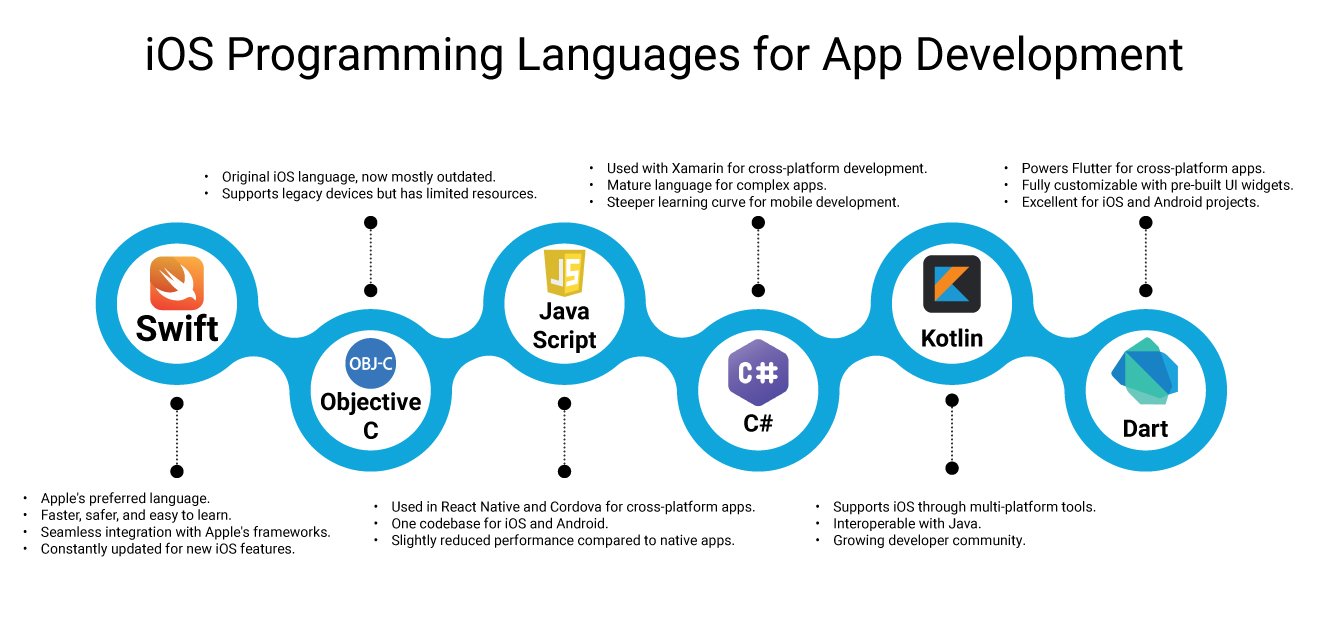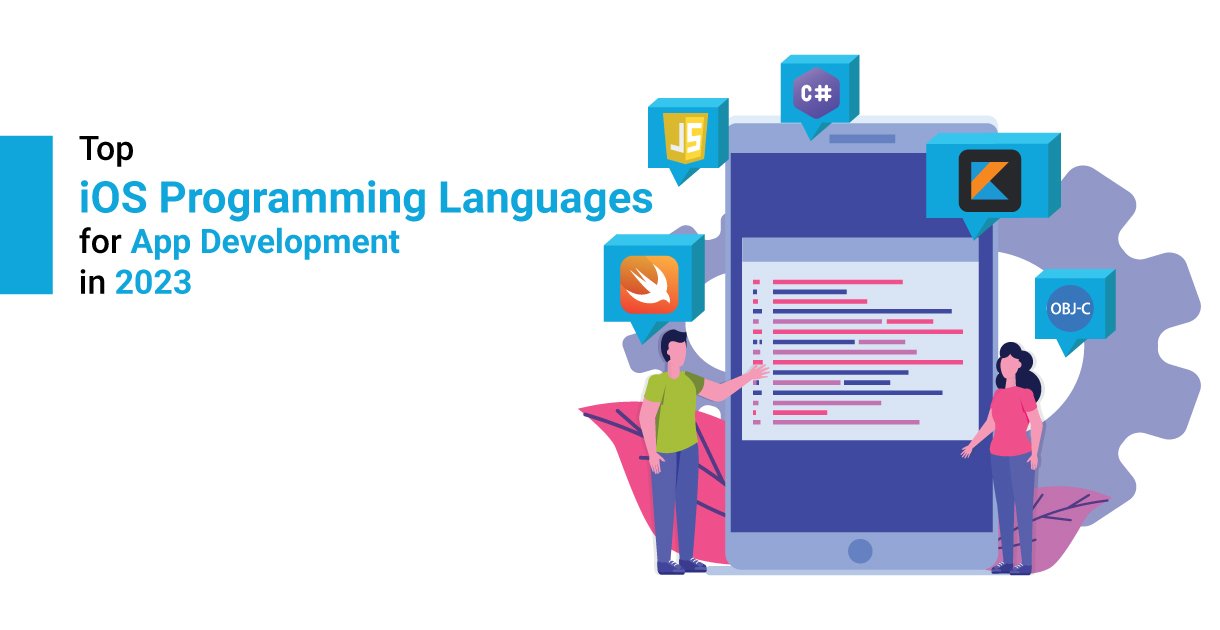Introduction to iOS Programming Languages
Apple has dominated the mobile market with iOS since the launch of the first iPhone in 2007. Today, over 1 billion devices run iOS, showing the massive customer base Apple has amassed. With over 1.6 million apps available, the Apple App Store is the second-largest mobile app marketplace. This massive user base and number of apps demonstrate the huge potential for developers on the iOS platform.
While iPhone app development languages originally required using Apple’s native Swift or Objective-C languages, developers now have more options for building iOS apps. In this article, we will explore the most popular programming languages used for iOS app development today and discuss which may be the best fit depending on your project needs.
Which Languages Are Used for iOS App Development?
 1. Swift
1. Swift
Swift is Apple’s preferred language and is considered one of the top IOS programming languages for building iOS apps. As an Apple-created language, Swift is fully supported by Apple and optimised for building apps for all Apple platforms like iOS, iPadOS, macOS, tvOS, and watchOS.

Some key benefits of using Swift include:
- It is faster and safer than Objective-C while being easy to learn and use for both beginners and experienced developers.
- Swift works seamlessly with Apple’s Cocoa and Cocoa Touch frameworks for building full-featured iOS apps with interfaces, graphics, databases and more.
- As the primary language supported by Apple, Swift has a large community and many learning resources available.
- Swift is constantly updated and improved by Apple to support new iOS features and stay optimised making it the best IOS programming language of all.
For most new iOS projects, Swift is the best language to use for a native app experience that takes full advantage of the latest iOS features.
2. Objective-C
Objective-C was the original language used and was considered one of the best iOS Development Languages when the platform launched. While now outdated, some developers continue using Objective-C for specific reasons like working on older codebases or needing to support legacy iOS devices.
Key points about Objective-C include:
- It has been around since the 1980s and is a more mature language than Swift, though also more complex.
- Objective-C apps may have advantages in terms of backward compatibility and supporting older iOS versions not updated for Swift.
- There are fewer resources and developers with Objective-C experience than Swift today.
-
Unless you have a specific need like supporting legacy devices, Swift is now generally a better choice over Objective-C for new IOS programming language projects.
3.JavaScript
JavaScript has become a popular iPhone Mobile app development framework as a popular option for building iOS apps due to frameworks like React Native and Cordova. With JavaScript, developers can create an app using common web technologies and deploy it to both iOS and Android.
Some upsides of a JavaScript approach include:
- Using one codebase for both platforms reduces development costs and makes maintenance easier.
- Leveraging web skills in languages like HTML, CSS, and JavaScript lowers the barrier to entry for mobile development.
- A large JavaScript developer community and many third-party libraries are available.
-
However, JavaScript apps may have slightly reduced performance compared to native. For projects targeting iOS specifically, a language like Swift is usually a better fit. But JavaScript enables powerful cross-platform solutions.
4. C#
Like JavaScript, C# allows sharing code across platforms using tools like Xamarin. This lets C# developers build native iOS apps while reusing significant logic from other projects.
Benefits of C# include:
- Mature and full-featured language suitable for complex enterprise apps.
- Large developer community and ecosystem of libraries and frameworks.
- Write once, deploy everywhere and approach lowers maintenance costs.
-
However, C# iOS requires using third-party frameworks like Xamarin, while Swift is fully supported natively being one of the best iOS programming languages. C# may also have a steeper learning curve than Swift for mobile development.
5. Kotlin
Kotlin has risen quickly in popularity as an alternative to Java for Android development. It is now fully supported and is considered a popular language for developing iOS apps and building iOS apps as well using multi-platform tools like JetBrains Compose.
Kotlin shares many of the same advantages as C# like code reuse across platforms. Key Kotlin points include:
- Interoperability with existing Java code and libraries.
- Strong static typing and null safety to avoid common bugs.
- Growing developer community and support from JetBrains.
-
While promising, Kotlin on iOS is still maturing compared to Swift. It works best for sharing business logic between Android and iOS apps.
6. Dart
Dart is Google’s language designed for client-side development which powers the popular Flutter framework for building Android app and IOS apps using a single codebase.
Benefits of Flutter/Dart include:
- The rapid development of fully customizable cross-platform apps.
- A large set of pre-built UI widgets and flexibility to build any interface.
- Backed by Google and a growing developer ecosystem.
- Potential to share more code than JavaScript solutions.
-
Dart is an excellent option when developing for both iOS and Android. For iOS-only projects, other native options may be better depending on your specific needs.
Want to Hire Top iOS Developers?
iOS Programming Languages’ Advantages for Businesses
- Performance – While cross-platform apps have come a long way, languages like Swift still offer the best performance for IOS programming languages as they are compiled into native code.
- Future-proofing – Swift is constantly updated by Apple, ensuring apps will continue supporting new iOS versions. Cross-platform frameworks are also regularly updated.
- Wider user reach – Building apps using cross-platform languages enables deploying to both iOS and Android, significantly increasing the potential user base over just building for one platform.
- Lower development and maintenance costs – Sharing significant code across platforms reduces the work needed compared to separate iOS and Android apps. Updates only need to happen in one codebase.
- Leveraging existing skills and talent – Languages like JavaScript, C# and Java allow tapping into larger pools of developers with those skills instead of just iOS-focused languages.

-
Before developing an IOS programming language app, what should you consider?
- Target audience: Define who your target users are in terms of demographics, interests, location etc. This will help design the app experience.
- Purpose of the app: Have a clear idea of what problem the app will solve for users. Define the core functionality and purpose.
- App features: Map out the key features and functionality the app will offer to serve its purpose. Prioritise features.
- App maintenance: Plan for ongoing support, bug fixes and new feature additions after launch.
- Monetization strategy: Consider how the app will be funded – ads, subscriptions, one-time payments etc.
- Legal/privacy: Comply with App Store guidelines and relevant privacy laws like GDPR.
-
Closing Remarks on iOS Programming Languages
In conclusion, Swift remains the best all-around choice for most new iOS Development language projects due to its full support and optimization by Apple. But languages like JavaScript, C#, Kotlin and Dart open the door to powerful cross-platform strategies or leveraging existing developer skills. Consider your business goals, timeline, and technical requirements to choose the right iOS development language.
Monarch Innovation is a leading Web development and Mobile app development company that is well-known among professionals, businesses, and firms for offering top-notch IT and data solutions. If you’re also searching for someone to handle all your project requirements and deliver creative and dependable solutions that will quickly boost your company’s future growth, get in touch with us. Monarch Innovation crafts custom solutions to help clients re-engineer their manufacturing processes so that they can enhance their organisational efficiency & deliver optimum results.
FAQs
Q.1 Why is Swift a popular choice for iOS app development?
Answer Swift is preferred due to its speed, safety, and modern syntax, making it the primary language for iOS development.
Q.2 Is Objective-C still relevant for iOS app development in 2024?
Answer Yes, Objective-C is still relevant, especially for maintaining legacy apps, but Swift is more commonly used for new projects.
Q.3 Which programming languages are in demand for iOS app development jobs in 2024?
Answer In addition to Swift and Objective-C, proficiency in JavaScript (for React Native) and Dart (for Flutter) can open up opportunities for iOS app development positions.
Q.4 Can I use Python for iOS app development in 2024?
Answer While Python is not a native iOS language, you can use frameworks like Kivy and BeeWare to develop iOS apps with Python.

